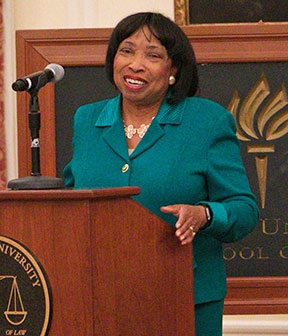Judge Bernice Donald considers the merits of dissents in James Madison Lecture
Over the last century, some legal commentators have criticized judicial dissent as a sign of disunity that diminishes the public’s confidence in the courts, while others have praised it as a tool for shaping history and foreshadowing positive changes to the law. Circuit Judge Bernice Donald of the U.S. Court of Appeals for the Sixth Circuit explored both views when she delivered the James Madison Lecture on Oct. 22 with a talk entitled “Judicial Independence, Collegiality and Dissent in Multi-Member Courts.”
“The right to dissent is precious,” said Donald, “and the reasons are often compelling.”
Donald, a former criminal defense lawyer who has also served as a bankruptcy judge and as a state court judge in Tennessee, quoted US Supreme Court Justice Charles Evans Hughes on the risks of dissents: “Published dissents detract from the force of the judgment, while unanimity promotes public confidence in the judgment.”
But Donald also cited dissents that anticipated changes to come. In Plessy v. Ferguson, for example, when the US Supreme Court upheld the constitutionality of “separate but equal” segregation laws, Justice John Harlan disagreed with the 7-to-1 majority, arguing that “our Constitution is colorblind…. In respect of civil rights, all citizens are equal before the law.”
Dissenting opinions can be prophetic, argued Donald. “[They] suggest the importance of the stakes when it comes to a judge’s decision.”
Selected remarks by Judge Bernice Donald:
“Sometimes, having that threat of dissent, or that proposed dissent, will cause the court to mute certain positions and the majority opinion that might have been made, or back away from something…. Judges really don't want to draw a dissent. They don’t want to lose the third judge. The court wants to issue majority opinions if it can. And if there's something people can do by moderating views, or by adding different things, the would-be dissenter can help shape that majority opinion so that it comes out a little more muted.”
“Rather than thinking of collegiality and dissent as binary, as mutually exclusive, it is possible and salutary to regard collegiality as a quality that may be present or absent, even in the face of dissent. It’s important for judges to have a wonderful command of the language, so that we can persuasively, eloquently, and respectfully make those dissents.”
“I talk to my clerks all the time about the process. We can disagree with outcomes, but we don't disparage and demean the people who hold those different views. And if, in fact, we are writing something where a judge is going to be reversed, they are instructed never to use that judge's name. Now if we are affirming and praising, we can use the name…but if we are reversing it, we don’t put that name in there.”
Posted November 26, 2018
Follow Judge Bernice Donald’s full remarks on video:


